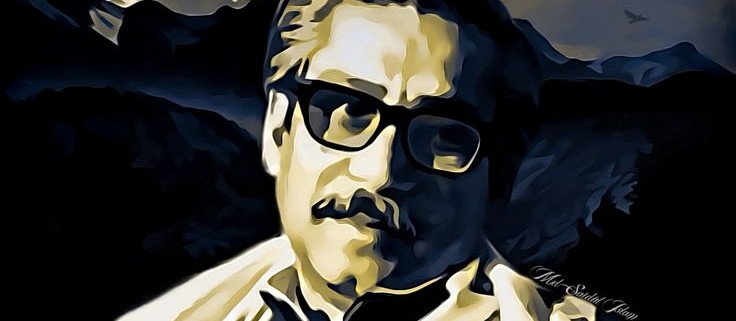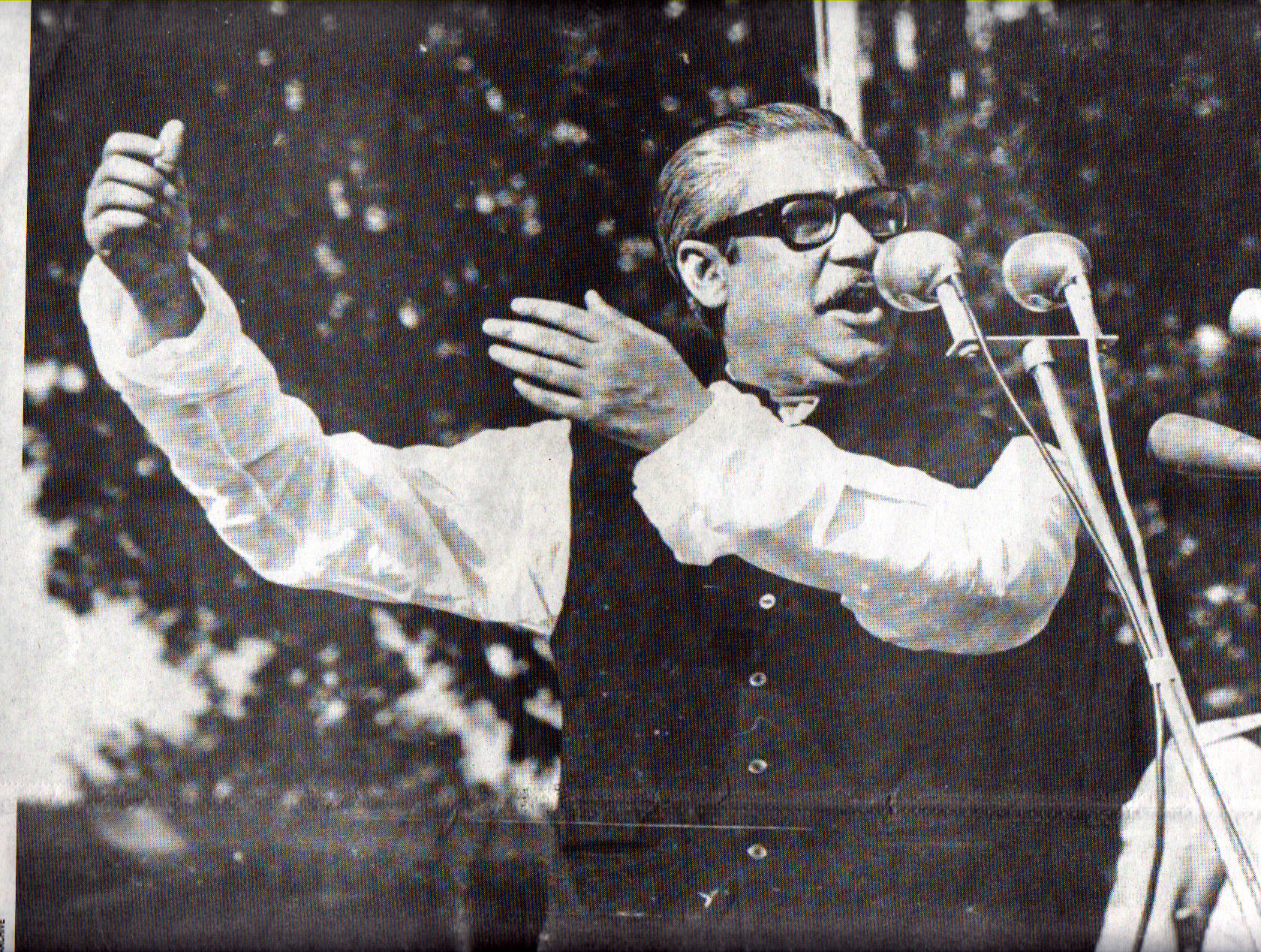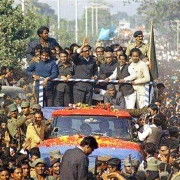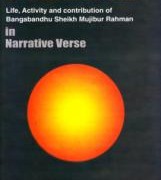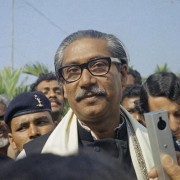Bangabandhu Sheikh Mujibur Rahman
The life of Bangabandhu Sheikh Mujibur Rahman is the saga of a great leader turning peoplepower into an armed struggle that liberated a nation and created the world’s ninth most populous state. The birth of the sovereign state of Bangladesh in December 1971, after a heroic war of nine months against the Pakistani colonial rule, was the triumph of his faith in the destiny of his people. Sheikh Mujib, endearingly called Bangabandhu or friend of Bangladesh, rose from the people, molded their hopes and aspirations into a dream and staked his life in the long battle for making it real. He was a true democrat, and he employed in his struggle for securing justice and fairplay for the Bengalees only democratic and constitutional weapons until the last moment. It is no accident of history that in an age of military coup d’etat and ‘strong men’, Sheikh Mujib attained power through elections and mass movement and that in an age of decline of democracy he firmly established democracy in one of the least developed countries of Asia.
Sheikh Mujib was born on 17 March 1920 in a middle class family at Tungipara in Gopalganj district. Standing 5 feet 11 inches, he was taller than the average Bengalee. Nothing pleased him more than being close to the masses, knowing their joys and sorrows and being part of their travails and triumphs. He spoke their soft language but in articulating their sentiments his voice was powerful and resonant. He had not been educated abroad, nor did he learn the art of hiding feelings behind sophistry; yet he was loved as much by the urban educated as the common masses of the villages. He inspired the intelligentsia and the working class alike. He did not, however, climb to leadership overnight.
Early Political Life: His political life began as an humble worker while he was still a student. He was fortunate to come in early contact with such towering personalities as Hussain Shaheed Suhrawardy and A K Fazlul Huq, both charismatic Chief Ministers of undivided Bengal. Adolescent Mujib grew up under the gathering gloom of stormy politics as the aging British raj in India was falling apart and the Second World War was violently rocking the continents. He witnessed the ravages of the war and the stark realities of the great famine of 1943 in which about five million people lost their lives. The tragic plight of the people under colonial rule turned young Mujib into a rebel.
This was also the time when he saw the legendary revolutionary Netaji Subhas Chandra Bose challenging the British raj. Also about this time he came to know the works of Bernard Shaw, Karl Marx, Rabindranath Tagore and rebel poet Kazi Nazrul Islam. Soon after the partition of India in 1947 it was felt that the creation of Pakistan with its two wings separated by a physical distance of about 1,200 miles was a geographical monstrosity. The economic, political, cultural and linguistic characters of the two wings were also different. Keeping the two wings together under the forced bonds of a single state structure in the name of religious nationalism would
merely result in a rigid political control and economic exploitation of the eastern wing by the all-powerful western wing which controlled the country’s capital and its economic and military might.
Early Movement: In 1948 a movement was initiated to make Bengali one of the state languages of Pakistan. This can be termed the first stirrings of the movement for an independent Bangladesh. The demand for cultural freedom gradually led to the demand for national independence. During that language movement Sheikh Mujib was arrested and sent to jail. During the blood-drenched language movement in 1952 he was again arrested and this time he provided inspiring leadership of the movement from inside the jail.
In 1954 Sheikh Mujib was elected a member of the then East Pakistan Assembly. He joined A K Fazlul Huq’s United Front government as the youngest minister. The ruling clique of Pakistan soon dissolved this government and Shiekh Mujib was once again thrown into prison. In 1955 he was elected a member of the Pakistan Constituent Assembly and was again made a minister when the Awami League formed the provincial government in 1956. Soon after General Ayub Khan staged a military coup in Pakistan in 1958, Sheikh Mujib was arrested once again and a number of cases were instituted against him. He was released after 14 months in prison but was re-arrested in February 1962. In fact, he spent the best part of his youth behind the prison bars.
Supreme Test: March 7, 1971 was a day of supreme test in his life. Nearly two million freedom loving people assembled at the Ramna Race Course Maidan, later renamed Suhrawardy Uddyan, on that day to hear their leader’s command for the battle for liberation. The Pakistani military junta was also waiting to trap him and to shoot down the people on the plea of suppressing a revolt against the state. Sheikh Mujib spoke in a thundering voice but in a masterly well-calculated restrained language. His historic declaration in the meeting was: “Our struggle this time is for freedom. Our struggle this time is for independence.” To deny the Pakistani military an excuse for a crackdown, he took care to put forward proposals for a solution of the crisis in a constitutional way and kept the door open for negotiations.
The crackdown, however, did come on March 25 when the junta arrested Sheikh Mujib for the last time and whisked him away to West Pakistan for confinement for the entire duration of the liberation war. In the name of suppressing a rebellion the Pakistani military let loose hell on the unarmed civilians throughout Bangladesh and perpetrated a genocide killing no less than three million men, women and children, raping women in hundreds of thousands and destroying property worth billions of taka. Before their ignominious defeat and surrender they, with the help of their local collaborators, killed a large number of intellectuals, university professors, writers, doctors, journalists, engineers and eminent persons of other professions. In pursuing a
scorch-earth policy they virtually destroyed the whole of the country’s infrastructure. But they could not destroy the indomitable spirit of the freedom fighters nor could they silence the thundering voice of the leader. Tape recordings of Bangabandhu Sheikh Mujib’s 7th March speech kept on inspiring his followers throughout the war.
Return and Reconstruction: Forced by international pressure and the imperatives of its own domestic predicament, Pakistan was obliged to release Sheikh Mujib from its jail soon after the liberation of Bangladesh and on 10 January 1972 the great leader returned to his beloved land and his admiring nation.
But as he saw the plight of the country his heart bled and he knew that there would be no moment of rest for him. Almost the entire nation including about ten million people returning from their refuge in India had to be rehabilitated, the shattered economy needed to be put back on the rail, the infrastructure had to be rebuilt, millions had to be saved from starvation and law and order had to be restored. Simultaneously, a new constitution had to be framed, a new parliament had to be elected and democratic institutions had to be put in place. Any ordinary mortal would break down under the pressure of such formidable tasks that needed to be addressed on top priority basis. Although simple at heart, Sheikh Mujib was a man of cool nerves and of great strength of mind. Under his charismatic leadership the country soon began moving on to the road to progress and the people found their long-cherished hopes and aspirations being gradually realized.
Assassination: But at this critical juncture, his life was cut short by a group of anti-liberation reactionary forces who in a pre-dawn move on 15 August 1975 not only assassinated him but 23 of his family members and close associates. Even his 10 year old son Russel’s life was not spared by the assassins. The only survivors were his two daughters, Sheikh Hasina – now the country’s Prime Minister – and her younger sister Sheikh Rehana, who were then away on a visit to Germany. In killing the father of the Nation, the conspirators ended a most glorious chapter in the history of Bangladesh but they could not end the great leader’s finest legacy- the rejuvenated Bengali nation. In a fitting tribute to his revered memory, the present government has declared August 15 as the national mourning day. On this day every year the people would be paying homage to the memory of a man who became a legend in his won lifetime. Bangabandhu lives in the heart of his people. Bangladesh and Bangabandhu are one and inseparable. Bangladesh was Bangabandhu Sheikh Mujibur Rahman’s vision and he fought and died for it.

